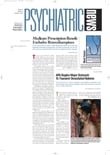Psychiatrists who treat a large number of patients who are dual eligibles—patients eligible for both Medicare and Medicaid benefits—may find they are having trouble making ends meet.
Medicare is the federal government's health insurance program for all persons aged 65 and over (and a few special groups of younger people), while Medicaid is jointly funded by the states and the federal government and largely serves individuals defined as “poor.” The states have some leeway in determining what services are covered and reimbursement amounts under their respective plans.
Since the passage of the Medicare Catastrophic Coverage Act of 1988, the states have been required to share the cost of care for Medicare beneficiaries who also qualified for Medicaid. Initially the states had the option of sharing costs for a service either at the full Medicare-approved rate or at the rate the state paid for a Medicaid patient who was not entitled to Medicare. The passage of the Balanced Budget Act of 1997 allowed the states a little more flexibility in setting the cost-sharing fees they pay for dual eligibles. According to the State Medicaid Manual (§3490.14):“ Your payment rates for particular services may be the same as the payment rates applicable for Medicaid recipients who are not Medicare eligible, or you may choose to set separate, higher payment rates up to the Medicare allowable rate for service or the Medicare deductible and coinsurance.”
Before the slowdown of the economy and the transfer of responsibility to the states for a number of social services that had previously been funded through federal monies, many states paid for health services provided to dual-eligible patients at the full Medicare-approved amount. When this was the case, it didn't make any difference to the physician whether a patient was covered by Medicare and paid the coinsurance out of pocket or through a Medigap policy, or whether the patient was a dual eligible with Medicaid picking up the coinsurance.
Since 2001, however, in an effort to continue to provide services in the face of declining revenues, many states have reduced their reimbursements for services provided to dual-eligible beneficiaries to only the amount allowable under their Medicaid plan. Some states pay nothing because the amount reimbursed by Medicare is equal to or more than the amount Medicaid pays for certain services. It is important to note that physicians are forbidden to bill Medicaid or dual-eligible patients for any copay other than a minimal fee that has been stipulated by some Medicaid programs.
Psychiatrists who provide outpatient care have found that this situation squeezes them economically because in most cases the care they provide is subject to Medicare's discriminatory outpatient mental health services limitation—that is, they are reimbursed for only 50 percent of the Medicare-approved amount rather than for 80 percent of the amount reimbursable for other types of medical care. In other words, for dual-eligible patients, psychiatrists receive only half of the amount the federal government has deemed to be reasonable compensation for the services provided.
Alzheimer's Exemption Enforced
One of the major exceptions to the outpatient services limitation is for treatment provided to patients with Alzheimer's and Alzheimer's-related disorders. This is of particular importance in any discussion of dual-eligible patients, since many dementia patients fall into this category.
Since 2001 APA's Office of Healthcare Systems and Financing (OHSF) has been working with the American Bar Association/Alzheimer's Association Medicare Advocacy Project and the Centers for Medicare and Medicaid Services (CMS) to ensure that state Medicare carriers are properly administering the Alzheimer's exemption. As a result of this joint effort, CMS is circulating a new instruction for Medicare carriers that is hoped to result in the proper application of the exemption.
A survey that OHSF conducted last year of state Medicare carrier medical directors found that only 10 states were correctly administering the exemption. It is vital that the Alzheimer's exemption be enforced so that these severely disabled, dually eligible patients will continue to receive the medically necessary care they require. Most physicians cannot afford to provide care at a cost that is only half of what they are entitled to receive.
OHSF Surveys State Medicaid Directors
OHSF is now surveying state Medicaid directors to track what each state is paying for psychiatric services for its dual-eligible beneficiaries. This survey was initiated when staff learned from the North Carolina Psychiatric Association's executive director, Robin Huffman, that psychiatrists in North Carolina receive a higher fee for providing a service to a patient who has only Medicaid coverage than for providing the same service to a patient who has Medicare coverage as well. This situation, which is clearly counter to Medicaid regulations, seems to have resulted from a miscalculation of the Medicare copay for outpatient psychiatric services.
OHSF Director Irvin “Sam” Muszynski, J.D., has written to the North Carolina Medicaid director explaining the law and how the copay should be calculated.
Said Muszynski, “There was a situation similar to this a few years ago with TriCare, the payer for military families' health insurance. As soon as we directed them to the regulations with the correct information, TriCare made the necessary corrections.” PP&MC will keep you posted.
If you are having problem with payments for dual-eligible patients in your state, please contact Ellen Jaffe. She can be reached by e-mail at
[email protected] or though the Managed Care Help Line at (800) 343-4671. ▪
